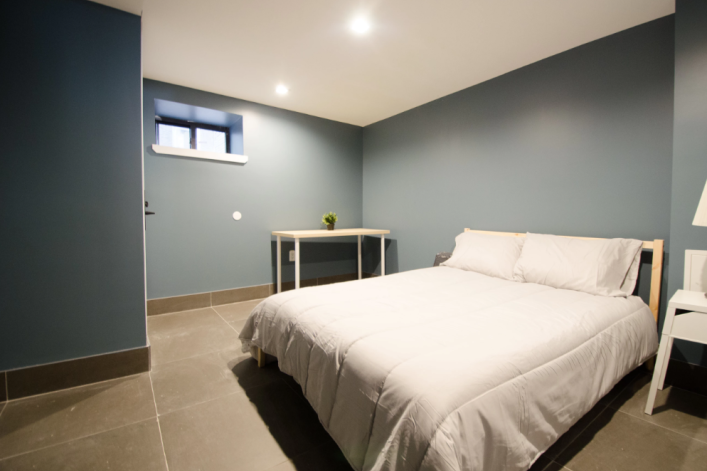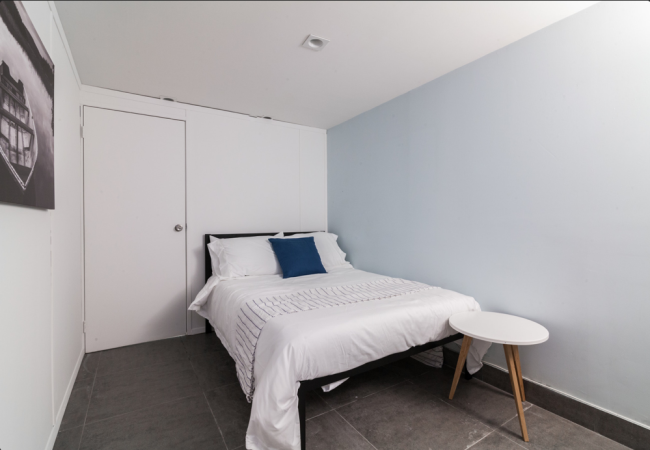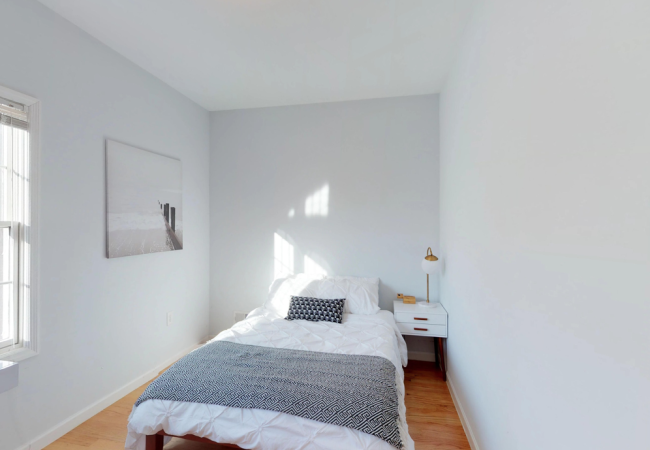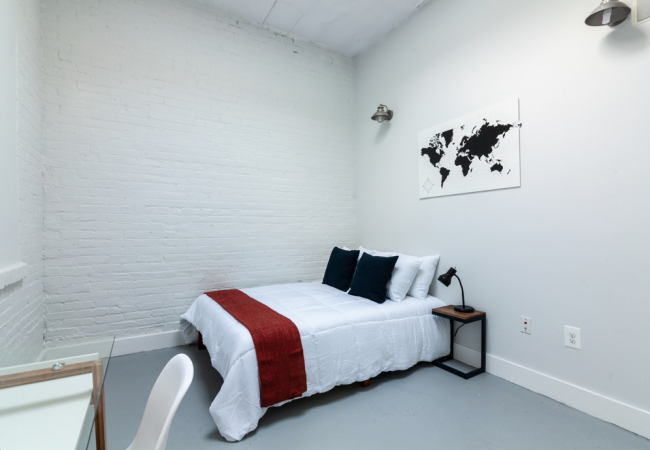Outpost co-living will offer Bedly renters new subleases, and says it runs its buildings differently

A bedroom in a Bedly apartment in Harlem currently listed for $1,252 a month. It appears to be in a basement (the street number is not listed).
Some renters at Bedly, a co-living company that shut down abruptly on July 21, leaving them scrambling for information about new subleases, appear likely to get much-needed stability.
A new co-living company is taking over some of Bedly’s buildings, but this will only impact a fraction of Bedly renters. For the majority of the company’s 600 tenants in 200 buildings, it is status quo, meaning major confusion.
In an announcement yesterday afternoon, Outpost Club, which has 15 houses in New York and San Francisco, says it will assume operational management for some of Bedly's properties in Manhattan and Jersey City. The statement says, “Outpost will maintain agreements with all Bedly members, including deposit and rent obligations, which will be rolled over into the Outpost system.”
This is pretty vague language, so Brick Underground sought some clarity.
A spokesperson for the company says Outpost “will manage six buildings in New Jersey. In New York, we’re still working with the landlords, but it will be between four and eight buildings.”
The spokesperson confirmed that tenants will be issued new subleases. “Anyone who wants to remain at their current location will need to sign a new sublease with Outpost as the co-subtenant, but they won’t be required to apply again, pay a new deposit or pay another installment of last month’s rent—all of that would roll over to us from Bedly.”
The question of legality
In previous posts, Brick has raised questions about the legality of some of Bedly’s rentals. Listings on the company’s website include three-dimensional views of apartments with windowless bedrooms that appear to be in basements, which is illegal in New York City.
Brick Underground spoke to a former Bedly employee who told Brick that the company knowingly flouted NYC law and created bedrooms in basements and bedrooms with no windows. The employee requested anonymity.
In addition, multiple leases that Brick has reviewed indicate the company is issuing separate leases for individual bedrooms within an apartment, which Sam Himmelstein, a lawyer with Himmelstein, McConnell, Gribben, Donoghue & Joseph who represents residential and commercial tenants and tenant associations (and is a Brick sponsor), says is “completely illegal” because it violates the anti-SRO law. Leases are supposed to be for the entire apartment, with all tenants in an apartment on the same lease.
Bedly CEO Martin Greenberg told Brick that those single-room leases are "legacy leases" still in use.
Outpost was asked how it will address the fact that Bedly’s practices in the past appear to have not abided by NYC law.
“Outpost follows all applicable laws in the cities in which we operate. We take the required steps to make sure the properties we manage are operationally and legally sound, and that will apply to the Bedly properties we’ll begin to manage, as well,” the spokesperson says.
In addition, according to the spokesperson, “in order to become subtenants, they’ll need to accept the terms of the Outpost sublease agreement, which is unique from Bedly and includes protections for our members traditionally found in sublease agreements, as well as additions for our members’ safety and comfort, like provisions against racism, sexism, homophobia.
“The affected Bedly members are under no obligation to sign the new agreement—there will be no financial penalty if someone decides they’d rather find housing elsewhere,” the spokesperson says.
The initial statement announcing the deal includes this statement from Outpost CEO Sergii Starostin: "We're diligently working on a plan to make this transition go as smoothly as possible, with minimal impact on the members."
The statement directs renters to email questions to [email protected]. However, this has been the general support contact for all Bedly renters, many of whom have taken to Twitter to express frustration with a lack of response.
The end of the statement has some bold claims.
Greenberg says, "Bedly was the first co-living company in the world and we have brought dramatic and structural change to the industry.” The statement also says the company has raised $7 million in capital, a figure that Greenberg provided Brick in a previous conversation.
Reported stories appear to contradict some of that information.
According to Crunchbase, Bedly was founded in 2015, and total seed funding was $2.7 million. A quick Internet search turns up other co-living companies that launched that same year, like Shanghai-based Harbor Apartments. And others that started even earlier.
The announcement concludes with this note: All deposits are accounted for and everyone has been communicated with regarding next steps, according to Greenberg.
Even for a press release, that's a lot of spin. Bedly renters have told Brick that communication in recent days from Bedly has been minimal and vague.
You Might Also Like





























